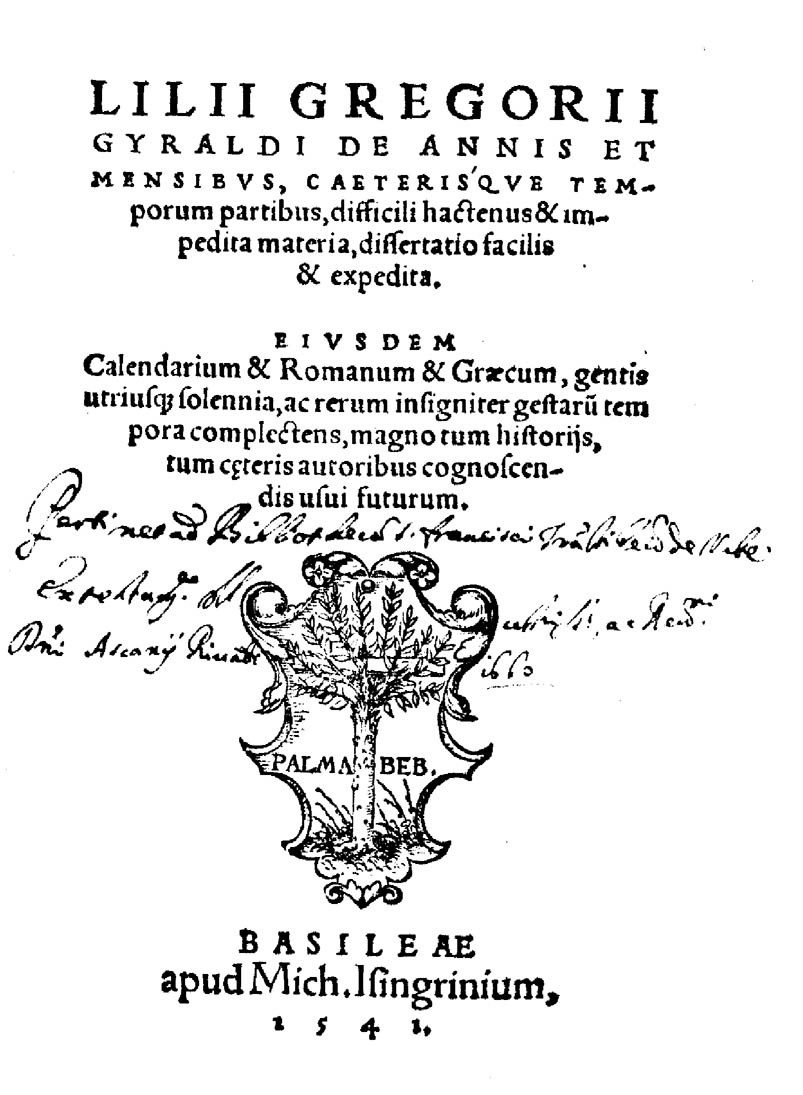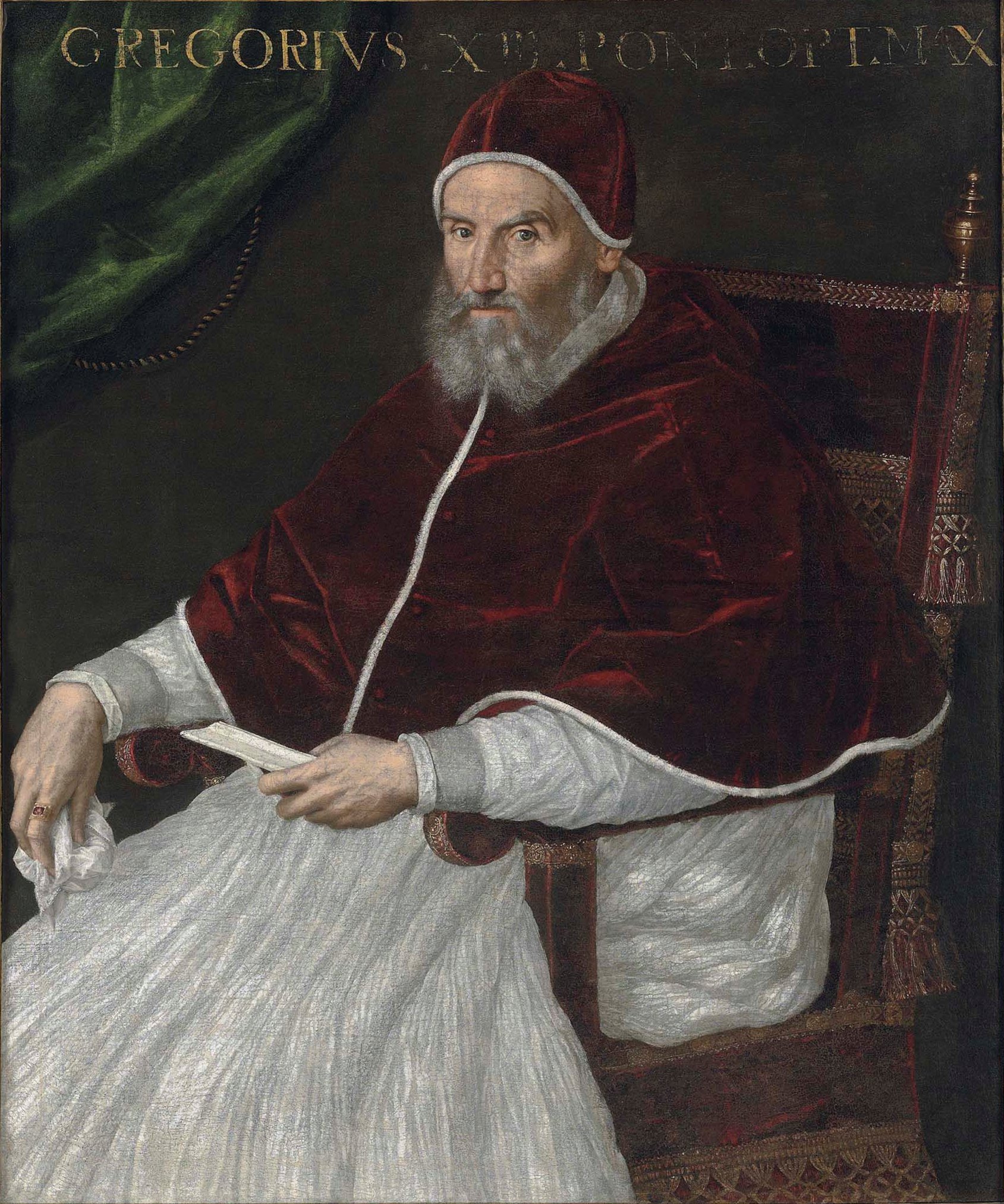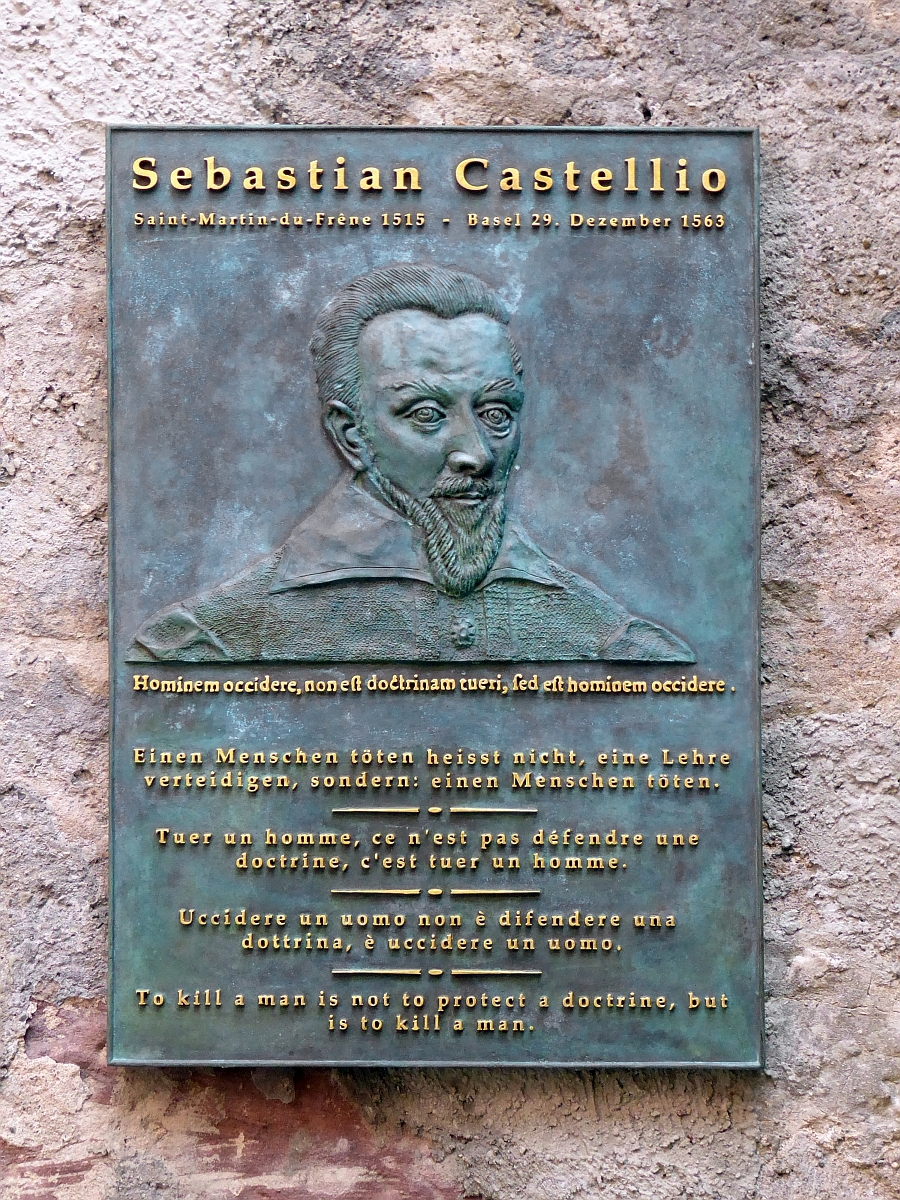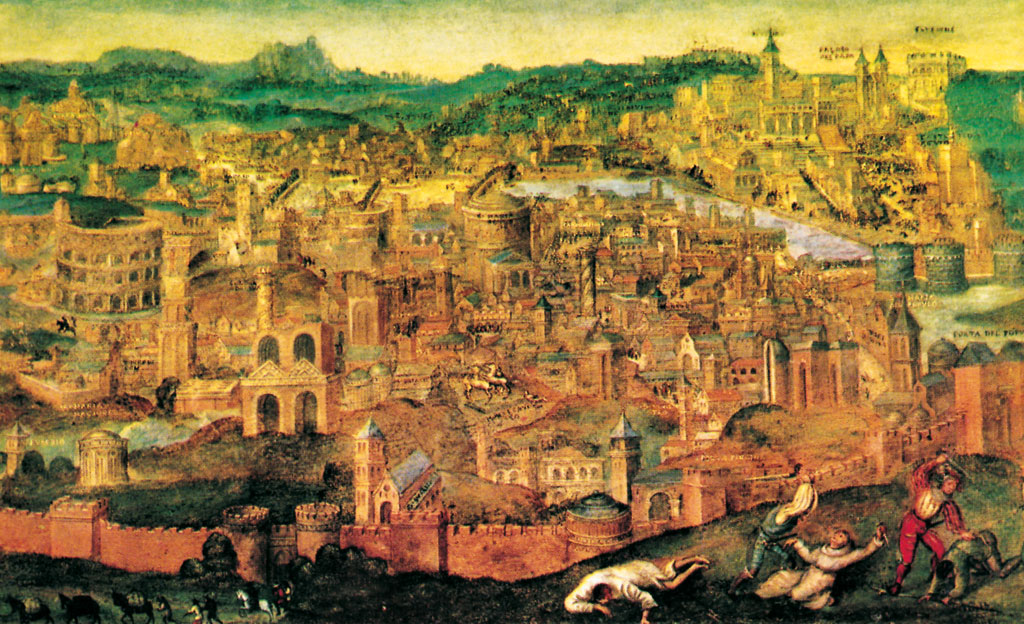|
Lilio Gregorio Giraldi
Giglio Gregorio Giraldi (Lilius Gregorius Gyraldus or Giraldus) (14 June 1479 – February 1552) was an Italian scholar and poet. He was born at Ferrara, where he early distinguished himself by his talents and acquirements. On the completion of his literary course, he removed to Naples, where he lived on familiar terms with Jovianus Pontanus and Sannazaro; and subsequently to Lombardy, where he enjoyed the favour of the Mirandola family. At Milan in 1507 he studied Greek under Chalcondylas; and shortly afterwards, at Modena, he became tutor to Ercole (afterwards Cardinal) Rangone. About the year 1514, he removed to Rome, where, under Clement VII, he held the office of apostolic protonotary; but having in the sack of that city (1527), which almost coincided with the death of his patron Cardinal Rangone, lost all his property, he returned in poverty once more to Mirandola, whence again he was driven by the troubles consequent on the assassination of the reigning prince ... [...More Info...] [...Related Items...] OR: [Wikipedia] [Google] [Baidu] |
Giraldi - De Annis Et Mensibus, Caeterisque Temporum Partibus, 1541 - 119386
Giraldi is a surname, and may refer to: * Bob Giraldi (born 1939), an American film and television director * Dez Giraldi (born 1986), an Australian soccer player * Franco Giraldi (1931–2020), an Italian film director * Giglio Gregorio Giraldi (1479–1552), an Italian scholar and poet * Giovanni Battista Giraldi, an Italian novelist and poet * Guglielmo Pecori Giraldi (1856–1941), an Italian Field Marshal * Orazio Giraldi (died 1617), a Roman Catholic prelate * Philip Giraldi, a former CIA agent * Stefano Giraldi (born 1968), Italian former road cyclist * Ubaldo Giraldi (1692–1775), an Italian canonist * William Giraldi (born 1974), American writer, critic, and journalist See also * Giraldii {{surname ... [...More Info...] [...Related Items...] OR: [Wikipedia] [Google] [Baidu] |
Protonotary
The word prothonotary is recorded in English since 1447, as "principal clerk of a court," from L.L. ''prothonotarius'' ( c. 400), from Greek ''protonotarios'' "first scribe," originally the chief of the college of recorders of the court of the Byzantine Empire, from Greek ' ''protos'' "first" + Latin ''notarius'' ("notary"); the -h- appeared in Medieval Latin. The title was awarded to certain high-ranking notaries. Byzantine usage The office of ''prōtonotarios'' ( el, πρωτονοτάριος), also ''proedros'' or '' primikērios'' of the ''notarioi'', existed in mid-Byzantine (7th through 10th centuries) administration as head of the colleges of the ''notarioi'' in various administrative departments. There were ''prōtonotarioi'' of the imperial ''notarioi'' (secretaries of the court), of the various ''sekreta'' or ''logothesia'' (government ministries), as well as for each '' thema'' or province.* The latter appeared in the early 9th century and functioned as the chief c ... [...More Info...] [...Related Items...] OR: [Wikipedia] [Google] [Baidu] |
Italian Poets
List of poets who wrote in Italian (or Italian dialects). A * Antonio Abati * Luigi Alamanni *Aleardo Aleardi *Dante Alighieri * Cecco Angiolieri * Gabriele D'Annunzio *Ludovico Ariosto *Francis of Assisi B *Nanni Balestrini *Dario Bellezza * Giuseppe Gioacchino Belli (Roman dialect) *Attilio Bertolucci *Carlo Betocchi * Alberta Bigagli * Giovanni Boccaccio * Maria Alinda Bonacci Brunamonti *Carlo Bordini * Franco Buffoni *Michelangelo Buonarroti *Helle Busacca *Ignazio Buttitta (Sicilian language) * Paolo Buzzi C *Dino Campana * Giorgio Caproni *Giosuè Carducci * Guido Cavalcanti * Roberto Carifi * Gabriello Chiabrera * Compagnetto da Prato D * Antonio De Santis (Italian and Larinese dialect) *Milo de Angelis *Fabrizio De André * Eugenio De Signoribus E *Muzi Epifani F * Franco Fortini *Ugo Foscolo G *Alfonso Gatto *Giuseppe Giusti * Corrado Govoni *Guido Gozzano *Lionello Grifo *Giovanni Battista Guarini * Amalia Guglielminetti *Margherita Guidacci *Guido ... [...More Info...] [...Related Items...] OR: [Wikipedia] [Google] [Baidu] |
1552 Deaths
Year 155 ( CLV) was a common year starting on Tuesday (link will display the full calendar) of the Julian calendar. At the time, it was known as the Year of the Consulship of Severus and Rufinus (or, less frequently, year 908 ''Ab urbe condita''). The denomination 155 for this year has been used since the early medieval period, when the Anno Domini calendar era became the prevalent method in Europe for naming years. Births * Cao Cao, Chinese statesman and warlord (d. 220) * Dio Cassius, Roman historian (d. c. 235) * Tertullian, Roman Christian theologian (d. c. 240) * Sun Jian, Chinese general and warlord (d. 191) Deaths * Pius I, Roman bishop * Polycarp, bishop of Smyrna Smyrna ( ; grc, Σμύρνη, Smýrnē, or , ) was a Greek city located at a strategic point on the Aegean coast of Anatolia. Due to its advantageous port conditions, its ease of defence, and its good inland connections, Smyrna rose to promi ... (b. AD 65) References {{DEFAULTSORT:155 ... [...More Info...] [...Related Items...] OR: [Wikipedia] [Google] [Baidu] |
1479 Births
Year 1479 ( MCDLXXIX) was a common year starting on Friday (link will display the full calendar) of the Julian calendar). Events January–December * January 20 – Ferdinand II ascends the throne of Aragon, and rules together with his wife Isabella I, Queen of Castile, over most of the Iberian peninsula. * January 25 – The Treaty of Constantinople is signed between the Ottoman Empire and Republic of Venice; Venice will cede Argo, Negroponte, Lemnos and Shkodër, and pay an annual tribute of 10,000 golden ducats. * April 25 – Ratification of the Treaty of Constantinople in Venice ends the Siege of Shkodra after fifteen months, and brings all of Albania under the Ottoman Empire. * May 13 – Christopher Columbus, an experienced mariner and successful trader in the thriving Genoese expatriate community in Portugal, marries Felipa Perestrelo Moniz (Italian on her father's side), and receives as dowry her late father's maps and papers, charting the se ... [...More Info...] [...Related Items...] OR: [Wikipedia] [Google] [Baidu] |
Pope Gregory XIII
Pope Gregory XIII ( la, Gregorius XIII; it, Gregorio XIII; 7 January 1502 – 10 April 1585), born Ugo Boncompagni, was head of the Catholic Church and ruler of the Papal States from 13 May 1572 to his death in April 1585. He is best known for commissioning and being the namesake for the Gregorian calendar, which remains the internationally accepted civil calendar to this day. Early biography Youth Ugo Boncompagni was born the son of Cristoforo Boncompagni (10 July 1470 – 1546) and of his wife Angela Marescalchi in Bologna, where he studied law and graduated in 1530. He later taught jurisprudence for some years, and his students included notable figures such as Cardinals Alexander Farnese, Reginald Pole and Charles Borromeo. He had an illegitimate son after an affair with Maddalena Fulchini, Giacomo Boncompagni, but before he took holy orders, making him the last Pope to have left issue. Career before papacy At the age of 36 he was summoned to Rome by Pope Paul III (1534� ... [...More Info...] [...Related Items...] OR: [Wikipedia] [Google] [Baidu] |
Gregorian Calendar
The Gregorian calendar is the calendar used in most parts of the world. It was introduced in October 1582 by Pope Gregory XIII as a modification of, and replacement for, the Julian calendar. The principal change was to space leap years differently so as to make the average calendar year 365.2425 days long, more closely approximating the 365.2422-day 'tropical' or 'solar' year that is determined by the Earth's revolution around the Sun. The rule for leap years is: There were two reasons to establish the Gregorian calendar. First, the Julian calendar assumed incorrectly that the average solar year is exactly 365.25 days long, an overestimate of a little under one day per century, and thus has a leap year every four years without exception. The Gregorian reform shortened the average (calendar) year by 0.0075 days to stop the drift of the calendar with respect to the equinoxes.See Wikisource English translation of the (Latin) 1582 papal bull '' Inter gravissimas''. Second, ... [...More Info...] [...Related Items...] OR: [Wikipedia] [Google] [Baidu] |
Epitaph
An epitaph (; ) is a short text honoring a deceased person. Strictly speaking, it refers to text that is inscribed on a tombstone or plaque, but it may also be used in a figurative sense. Some epitaphs are specified by the person themselves before their death, while others are chosen by those responsible for the burial. An epitaph may be written in prose or in poem verse. Most epitaphs are brief records of the family, and perhaps the career, of the deceased, often with a common expression of love or respect—for example, "beloved father of ..."—but others are more ambitious. From the Renaissance to the 19th century in Western culture, epitaphs for notable people became increasingly lengthy and pompous descriptions of their family origins, career, virtues and immediate family, often in Latin. Notably, the Laudatio Turiae, the longest known Ancient Roman epitaph, exceeds almost all of these at 180 lines; it celebrates the virtues of an honored wife, probably of a consul. So ... [...More Info...] [...Related Items...] OR: [Wikipedia] [Google] [Baidu] |
Sebastian Castalio
Sebastian Castellio (also Sébastien Châteillon, Châtaillon, Castellión, and Castello; 1515 – 29 December 1563) was a French preacher and theologian; and one of the first Reformed Christian proponents of religious toleration, freedom of conscience and thought. Introduction Castellio was born in 1515 at Saint-Martin-du-Frêne in the village of Bresse of Dauphiné, the country bordering Switzerland, France, and Savoy. Under the Savoyard rule his family called itself Chateillon, Chatillon, or Chataillon. Having been educated at the age of twenty at the University of Lyon, Castellio was fluent in both French and Italian, and became an expert in Latin, Hebrew and Greek as well. Subsequently, he learned German as he started to write theological works in the various languages of Europe. His education, zeal and theological knowledge were so outstanding that he was considered to be one of the most learned men of his time - equal, if not superior, to John Calvin. Regarding Caste ... [...More Info...] [...Related Items...] OR: [Wikipedia] [Google] [Baidu] |
Michel De Montaigne
Michel Eyquem, Sieur de Montaigne ( ; ; 28 February 1533 – 13 September 1592), also known as the Lord of Montaigne, was one of the most significant philosophers of the French Renaissance. He is known for popularizing the essay as a literary genre. His work is noted for its merging of casual anecdotes and autobiography with intellectual insight. Montaigne had a direct influence on numerous Western writers; his massive volume ''Essais'' contains some of the most influential essays ever written. During his lifetime, Montaigne was admired more as a statesman than as an author. The tendency in his essays to digress into anecdotes and personal ruminations was seen as detrimental to proper style rather than as an innovation, and his declaration that "I am myself the matter of my book" was viewed by his contemporaries as self-indulgent. In time, however, Montaigne came to be recognized as embodying, perhaps better than any other author of his time, the spirit of freely entertain ... [...More Info...] [...Related Items...] OR: [Wikipedia] [Google] [Baidu] |
Ercole Rangone
Ercole Rangoni or Ercole Rangone (died 25 August 1527) was a cardinal (Catholicism), cardinal and religious leader of the Catholic Church for 10 years. Biography He served as Bishop of Adria from 1519 to 1524 and Bishop of Modena from 1509 until his death. Wikipedia:SPS, He was made a cardinal in July 1517 by Pope Leo X. This was during his fifth Papal consistory, consistory. Not much information is known about Ercole, but he served as a cardinal for the Catholic Church, in Vatican City. When his mother became a widow in 1500, she took the family back to Modena. When he finished his studies, he went to Rome and entered the service of Cardinal Giovanni de' Medici, future Pope Leo X. When the cardinal, who was papal legate, was taken prisoner by the French in 1512. In Ravenna, Ercole who was in Rome, was sent by his mother to assist the cardinal with gifts and help; he wanted to remain with the cardinal and share with him his prison but the latter did not allow it and asked Erco ... [...More Info...] [...Related Items...] OR: [Wikipedia] [Google] [Baidu] |
Sack Of Rome (1527)
The Sack of Rome, then part of the Papal States, followed the capture of the city on 6 May 1527 by the mutinous troops of Charles V, Holy Roman Emperor during the War of the League of Cognac. Despite not being ordered to storm the city, with Charles V intending to only use the threat of military action to make Pope Clement VII come to his terms, a largely unpaid Imperial army formed by 14,000 Germans, many of Lutheran faith, 6,000 Spaniards and some Italian contingents occupied the scarcely defended Rome and began looting, slaying and holding citizens for ransom in excess without any restraint. Clement VII took refuge in Castel Sant'Angelo after the Swiss Guard were annihilated in a delaying rearguard action; he remained there until a ransom was paid to the pillagers. Benvenuto Cellini, eyewitness to the events, described the sack in his works. It was not until February 1528 that the spread of a plague and the approach of the League forces under Odet de Foix forced the army t ... [...More Info...] [...Related Items...] OR: [Wikipedia] [Google] [Baidu] |






